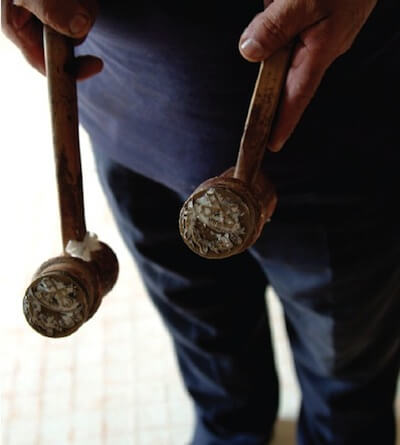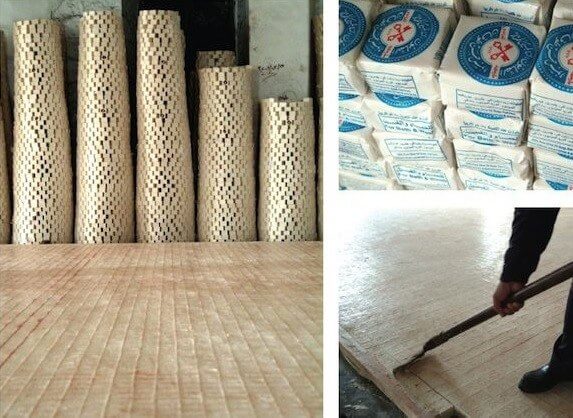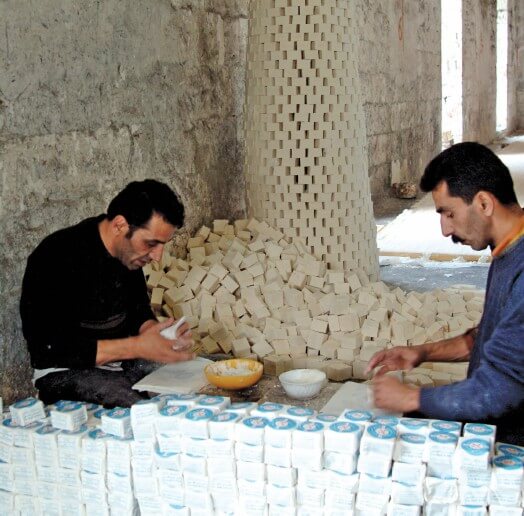Interview with Farouk Toukan – Chairman of the Toukan Enterprise
The Palestinian city of Nablus has been known for a long time as a historical center of the soap industry. In this beautiful city, soap makers find the right environment and conditions to prosper, as it is renowned for its abundance of olive trees and the production of olive oil, which is the key component of soap. For over a century the Toukan family has been one of the champions of the Nabulsi soap makers and is till today maintaining the traditional craft in its original form. Tharawat magazine speaks to Farouk Toukan, Chairman of the Toukan Enterprise about the history of the trade, the family legacy, and the making of soap.
The soap industry in Nablus has been associated with the names of a few well-known Palestinian families, such as the Shak’a, the Al-Masri, and the Toukan family. The Toukan factory is one of the most famous and oldest factories in Nablus. It was built around 1910 on the outskirts of the old city, which is now its heart. The factory was established by the two brothers Hafiz and Abdul Fattah Toukan who belonged to the sixth generation after Ibrahim Aagha Al Shawrbaji, the grandfather of all the Tuqan family branches. In 1929, the soap factory became a limited liability company under the name “Hafez & Abdel Fattah Tuqan Ltd. Co.” and the Two Keys “Al Muftaheen” logo was registered as a trademark. In order to avoid the falsification of the Two Keys logo, the Board of Directors decided in 1940s to register other similar trademarks, such as Two Swords, Two Scissors, and Two Axes, and they are all still registered to the present day. When the West Bank became a part of Jordan in 1950, the Board registered at the Jordanian Ministry of Economy under the number 49; making it one of the leading companies in the region.
What has not changed in the Toukan family business is the traditional craft. The soap is made from pure olive oil, Caustic Soda, water and salt. The manufacturing process of the Nabulsi soap is divided into four phases. There is a team for cooking the soap, another for spreading it, a third for cutting it, and a fourth for wrapping it in paper. Currently, the total number of workers in the Tuqan soap factory is 17 and all belonging to Palestinian families that have expertise at the respective phase of manufacturing.
The Toukan family retains ownership of this factory and manages its family legacy. The company is managed by a board of directors, and one of its members or shareholders is appointed as the CEO to handle daily activities. This arrangement remained in force until the year 2007 when a non-family member has been appointed as the CEO. Members of the board of directors are Farouk Khalil Toukan, President; Gaafer Ibrahim Toukan, Vice President; Wael Daoud Toukan, Director. The Board meets regularly, but the Chairman continues to supervise all operations on a monthly basis. The company has continued in this organisational structure while training the management to cope with day-to-day business.
Now, the Board of Directors are considering the possibility of making soap in small bars for use in hotels , and exports to East Asian countries. The possibility of mechanising the production to meet the demand in the new markets also exsists.
Because of the unique site of the soap factory in the heart of Nablus, it has been visited by many dignitaries such as the historian Mr. Shakib Arslan, historian Mr. Arnold Toynbee, Mr. Balewa former Nigerian Prime Minister and recently former British Prime Minister Mr. Tony Blair.
The production of soap is an old tradition in the Middle East. The city of Nablus in particular gained a reputation for the high quality of its soap and became an important center of regional manufacturing ever since the time of the Crusaders’ occupation. How did the Toukan business evolve over its long history in the region?
I know of two places that are known for the manufacturing of soap made of olive oil; Nablus in Palestine and Tripoli in Lebanon. I think that the main reason behind making soap in these two cities is the quality of olive trees they have. Nablus is a city surrounded by olive trees. You can see them everywhere and they are beautiful and old.
Founders of our business were Hafez, my grandfather, and his brother, Abdulfattah, followed by my uncle, Daoud, my father, Khalil, my uncle, Qadri, and then my cousins, Hafez and Amin. God bless their souls. We are originally from Syria from the Arab Al Mawali.
My forefather Ibrahim Agha Al-Shourbaji came to Palestine in the 16th century but our old house was built around 1725. The Toukans and the Abu Risheh family of Syria came from the same tribe and I still have a very old book about “Tel Toukan” (Toukan Hill) a place in Syria.
In the past, we made soap using a substance called “Qeli”; we used to bring it from the desert. After fermentation our suppliers would bring it to us. I still remember when Mithqal Pasha Al-Fayez, a prominent tribal leader of trans-jordan, used to come to our soap factory as he was the main supplier of “Qeli” during WWII. At the time there was no more caustic soda (sodium hydroxide) to be gotten from England, which we used to buy from ICI (Imperial Chemical Industries) through the late Abdul Hadi Hammoudeh, who was the founder of the largest dairy producing company in Jordan Alban Hamooda.
Before this I also remember that we used to have the olive oil coming from the villages on camels and the camels used to sleep in the sabaneh. They used to put the olive oil in a “Daref” (a container made of the skin of goats) and then we put it in “Al haleh”, which is the big pan that we used to cook the soap in. Underneath it, as a fuel, we used Al-Jifet (Remainder of the olives after getting the oil out). The burnt Jifet was called “Dugg”, which we used in winters for heating our houses and which we gave as gifts to family friends. I remember on the winter nights, when I was still a student, we used to gather around the “Manqal” or “Kanoun” and we used to heat the Nabulsi cheese, bread and teapots on the fire.
What remained after using the “Dugg” we used to clean the cooking pans and brassware. We had no detergents then. So as you can see, the olives were part of our daily lives in every respect.

How much were you involved in the soap business? And were any of the Toukan family members involved in the making of soap?
I personally was not involved. My grandfather’s brother Abdulfattah, who is also the father</span> of the poets Ibrahim and Fadwa Toukan, was the businessman in the family. My father and his brother went to study in Istanbul in 1910 and 1911. Because of this background they wanted things to be professional and transparent. They didn’t want it to be just a shop that sells soap; they wanted to run a professional business. That is why my father transformed the firm into a limited liability company in 1929; we were the first company in Nablus to be a LLC unlike other establishments and “Masaben” (soap factories) who undertook this transformation only many years later. We started out this business with two shareholders and now there are 35.
We were not involved in making the soap for a simple reason; we had other small families involved in each stage of making the soap. The first stage is the cooking, which takes five days, and then the spreading. The workers that attend to this first stage are called “Al Tabbeekha” – the cooks
The second stage workers are “Al Bassita” – the spreaders; this is actually a very delicate job: The workers spread the liquid soap and to maintain the thickness have to use very primitive tools that they still utilise today. After that the soap takes two or three days to dry depending on the weather; in the winter it takes longer. Then you have the cutters, they smoothen the surface and then they cut it into small bars using a rope called “Al Bikar”. Following the cutters, come the stampers – “Al Khatimeh”- to stamp each soap bar with our company’s logo (Al Muftaheen). Finally, come the wrappers (Al Lafeefah) to wrap the soap bars.
Each stage has tended to by different families who are known to be experts in their respective field. For example, we had the Tubaily family working in spreading the soap, the Al Asy family cooking the soap and some of Al-Jawhary family working in wrapping. Till now we have people of those families working in different stages of production. Our Sabbana produces one ton of soap every day, which amounts to about 360 tons every year. We work at full capacity.
When the West Bank became part of Jordan in 1950, we were amongst the first 50 companies to register with the Ministry of Commerce. We also have other brands for soap; our main brand is the Muftahain (two keys) but we also have three other brands. We use those stamps every 5 or 6 years just to keep them alive.
Has the numbers of the workers in each stage of the soap production increased or decreased over the years?
I think it has decreased, because we have wells now and we put the olive oil in them and then we pump it into the pan. We don’t need workers for that stage anymore. So it has decreased marginally.
What is the biggest market for the Toukan soap?
The markets were distributed as follows according to the three most famous soap brands in Palestine then: Al Muftahain started out in North Palestine and then brand recognition moved to Irbid and the surroundings. The Masri brand (Naameh – The Ostrich) had its main market in Jordan and remained there after 1948. The Shakaa brand (Al-Jamal-the Camel) got the south of Palestine and now is recognised in Hebron. Of course, we have small customers in Amman. We have started recently to export to America. There are shops in San Diego that sell our soaps; we also send small amounts to Italy.
There was always a gentlemen’s agreement between the soap factories’ owners. The three factories I just mentioned have exactly the same practices; when we buy oil we all get it from the same origin and the same counts for the caustic soda. If we run short of anything we borrow from each other. No one would increase the price of soap unless the three factories’ owners agree on it, so the price has always been fixed like the price of stamps.
The old Toukan workshop is still active and working, what are the challenges and opportunities that the business faces today?
You know, since the beginning the soap sales have always been consistent; we don’t sell more or less. Today, the big demand on European soaps and sanitizers can be a challenge for us.
We have two distributors; one in Amman and one in Irbid. We have been working with the same people since the beginning. In Amman, we have worked with the same family business from the generation of their great-grandfather, then the grandfather, and now his sons. However, the grandsons are not interested in the business. They went to the States and they don’t want to carry on with the family business. So the challenge for us, if we can call it a challenge, is to find someone else who we can trust and work with again.
We are very confident at keeping aloft of challenges, for example, we have computerised our accounting system. We were the first ones to do that. It is very detailed now and we keep a strict overview. I visit Nablus once a month to meet with the manager in charge and I receive bi-monthly reports. The current GM is not a family member, he used to be the CFO and we promoted him later.

Do you see a future for SMEs in the Arab world? Can SMEs be role models like the Toukan Soap factory?
In Palestine, I think there is a chance but expansion and growth possibilities are limited. However, there are very successful examples of small family businesses like Al Hijjawi Prints, they print cartoon boards and papers, and there are the businesses in the Taheena industry (sesame paste) like the Aloul and Ayesh Families.
What do you see in the near and long-term future of the Toukan business?
The soap business is very dear to my heart and I can’t see it die! It is not a matter of money. I go every month to Nablus just because it means a lot to me personally and to all my cousins. I am thinking to use the brand of the two keys in creating a logo for my library. The two crossed Libras with my name underneath and the two words Faith and Reason written too.
We are thinking of merging with another soap factory and to start making soap in smaller sizes in order to export to Far East countries. We will keep the traditional aspect of the industry but we will improve the soap bars to be a little smaller. We might mechanise the production processes and produce soaps outside Nablus. This will really make life easier for us because sometimes it is difficult to export from Nablus.
Is there another Toukan family member who is showing interest in the soap business?
No, not that I know of, but if necessity arises they might join. We are thinking of involving some women from the family in the board of directors. At the present time my other cousins live abroad and the young generation unfortunately knows nothing about the business of soap.
Tharawat Magazine, Issue 10, 2011
















